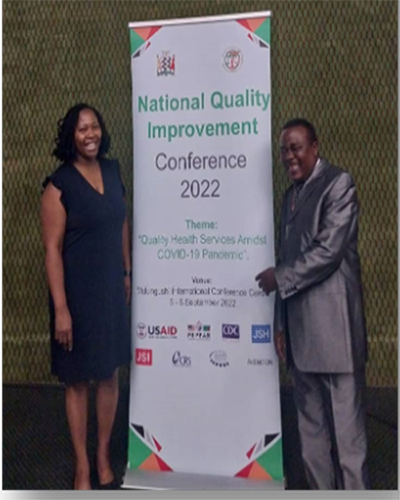April 12, 2023
 Congratulations are in order as Community Impact to Reach Key and Underserved Individuals for Treatment and Support (CIRKUITS) settles into year five and remains a leader in helping Zambia close the gaps in HIV epidemic control. From the start, CIRKUITS focused on providing HIV service from community peers to adolescents, key populations including men who have sex with men, female sex workers, and prison populations; men under 30 and transient populations; pregnant and breastfeeding women and their families; as well as the general population.
Congratulations are in order as Community Impact to Reach Key and Underserved Individuals for Treatment and Support (CIRKUITS) settles into year five and remains a leader in helping Zambia close the gaps in HIV epidemic control. From the start, CIRKUITS focused on providing HIV service from community peers to adolescents, key populations including men who have sex with men, female sex workers, and prison populations; men under 30 and transient populations; pregnant and breastfeeding women and their families; as well as the general population.
“We have been fortunate to work with multiple partners to achieve the successes of CIRKUITS. First and foremost is the Ministry of Health (MOH), whom we partner with to achieve results for the people of Zambia. From MOH Headquarters in Lusaka to Provincial Health Office to District Health Offices to the health facilities themselves, the MOH staff have been critical. Another Government of Zambia partner that has been crucial is the Zambia Correctional Services, with whom we work with to provide health services in the prisons,” said Dr. Cassidy Claassen, Principal Investigator and Chief of Party for the CIRKUITS Project, as he praises the successful group efforts.
 “We are also grateful for our fellow implementing partners, particularly Ciheb Zambia, who supports all of our community health implementation as well as DREAMS (Determined, Resilient, Empowered, AIDS-free, Mentored, and Safe). CIDRZ (Centre for Infectious Disease Research Zambia) helped us initially to develop programs in prisons and for adolescents. Under DREAMS, we also work with YWCA and Expanded Church Response (ECR). ECR and ZINGO (Zambia Interfaith NGO) helped us to reach religious communities via the Faith Communities Initiative. And our KP CSO partners working under KPIF have been critical to reaching KPs in Zambia: The Lotus Identity, TransBantu Association of Zambia, and Umotto Centre for Culture.”
“We are also grateful for our fellow implementing partners, particularly Ciheb Zambia, who supports all of our community health implementation as well as DREAMS (Determined, Resilient, Empowered, AIDS-free, Mentored, and Safe). CIDRZ (Centre for Infectious Disease Research Zambia) helped us initially to develop programs in prisons and for adolescents. Under DREAMS, we also work with YWCA and Expanded Church Response (ECR). ECR and ZINGO (Zambia Interfaith NGO) helped us to reach religious communities via the Faith Communities Initiative. And our KP CSO partners working under KPIF have been critical to reaching KPs in Zambia: The Lotus Identity, TransBantu Association of Zambia, and Umotto Centre for Culture.”
Year five of CIRKUITS incorporates Continuous Quality Improvement (CQI) process to further improve patient care and population health and reduce costs. The benefits of the CQI approach include the following:
- Shortness of time for program execution (9 months)
- Ensure 3600 views of the thematic areas.
- Routinely assessing performance against key program benchmarks (processes, outputs, and outcomes)
- Improving data analysis and data use culture during program review
- Highlighting flashpoints for technical glitch

At the 2022 National QI Conference, a platform where healthcare providers and patients share knowledge and experiences to reach the 2030 vision, CIRKUITS received the QI award. Out of three submitted abstracts, two were accepted for oral presentation. UMB-Zambia got third place for overall best presentation.
“We hope that the important work done by CIRKUITS will be continued under a follow-on grant. Regardless, we have built lasting and sustainable community structures for previously unreached groups in Zambia, and we hope that these will continue onwards,” said Dr. Cassidy Claassen as he reflected on CIRKUITS’ future. “The goal is that all Zambians, regardless of age, gender, or sexuality, will have access to HIV health services provided in a manner that is helpful to them.”
Contact
Center for International Health, Education, and Biosecurity
Institute of Human Virology
Anthony Okoth
Regional Communications Specialist

